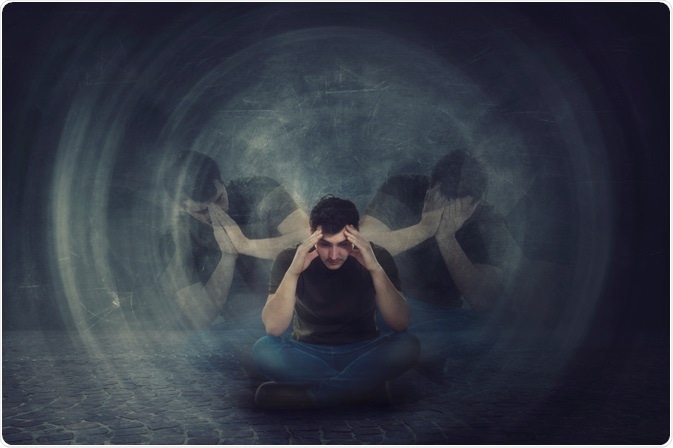A delusion is a belief that is obviously false, indicating an abnormality in the thought process. The key feature of delusion is the extent to which a person believes the delusion is true. A person experiencing a delusion will be firmly convinced that what they think is correct, despite evidence to the contrary.
 Image Credit: StunningArt / Shutterstock.com
Image Credit: StunningArt / Shutterstock.com
Several risk factors increase the risk of delusion developing and some of these include:
- Middle or older age
- Poor hearing or vision
- Social isolation
- Unfamiliar circumstances (such as experienced by immigrants)
- Low socioeconomic status
- Financial difficulties and loss of gainful employment
- Paranoid, schizoid, or avoidant personality disorder
Delusions are indicative of a neurological, medical or mental disorder and some of the conditions in which they may present include the following:
- Psychotic disorders such as schizophrenia, delusional disorder and substance-induced psychotic disorder
- Major depressive disorder
- Bipolar disorder
- Dementia
- Delirium
Types of delusion
Delusions are either described as bizarre or non-bizarre. A bizarre delusion is completely implausible such as believing aliens have removed a part of your brain, for example. A non-bizarre delusion is a belief that is clearly mistaken, but is at least potentially possible such as believing police or spies are watching you.
Delusions are also categorized as either mood-congruent or mood-incongruent. A delusion that is mood congruent is one that is consistent with a manic or depressed state. For example, someone with mania may decide they are famous or have special talents and someone with depression may believe the world is coming to an end. A mood-incongruent delusion is not consistent with one of these states and is instead mood neutral. For example, a person with depression may believe outsiders are inserting thoughts into their mind and they do not recognize these thoughts as their own.
Delusional disorder
Delusional disorder is a form of psychosis where a person cannot differentiate between what is imagined and what is real. The main feature of the condition is the presence of non-bizarre delusions such as being followed, deceived, cheated, poisoned or conspired against. Affected individuals can often socialize and function in a normal way, apart from the subject of their delusion and do not exhibit obviously strange behavior. However, some people can become so obsessed with their delusion that it does start to cause disruption in their life.
Although delusions may occur as a symptom of disorders such as schizophrenia, delusional disorder itself is uncommon. It is slightly more common among women than men and usually affects individuals who are middle-aged or older.
The main types of delusional disorder are described below:
- Somatic: Here, an individual falsely believes they have a medical condition or physical defect.
- Jealous: This is characterized by a belief that an individual’s partner is being unfaithful to them.
- Erotomanic: Someone with erotomanic delusional disorder believes someone else is in love with them. The person they believe this about is often important or famous. Stalking behavior may occur as well as attempts to contact the subject of the delusion.
- Persecutory: Here, a person believes they or someone close to them is being mistreated or that someone is planning to harm them. These individuals may make repeated complaints to the police or other authorities.
- Grandiose: A person with grandiose delusional disorder has an exaggerated sense of self worth, power, identity or knowledge. They may think they are highly talented or that they have made a significant discovery
- Mixed: In mixed delusional disorder, two or more of the above types of disorder are present.
What is Delusional disorder? How Is It Different From Schizophrenia?
Development of delusional disorder
The exact cause of delusional disorder is not yet clear, but researchers have been investigating the role that different biological, genetic, physiological or environmental factors might play. These are described below.
- Biological: Scientists have looked at how certain areas of brain abnormality may contribute to the development of delusional disorder. They believe that abnormal functioning of brain regions that control thinking and perception may be associated with the onset of delusional symptoms.
- Genetic: Researchers have found that delusional disorder is more common among people who have schizophrenia or delusional disorder running in their families, suggesting there may be a genetic basis to the condition.
- Psychological and environmental: Research has suggested that stress may trigger delusional disorder. The abuse of substances such as drugs or alcohol may also be contributing factors. In addition, people who have become isolated such as immigrants or those with impaired hearing or vision also seem to be more susceptible to developing the condition.
References
Further Reading
Last Updated: Dec 21, 2022